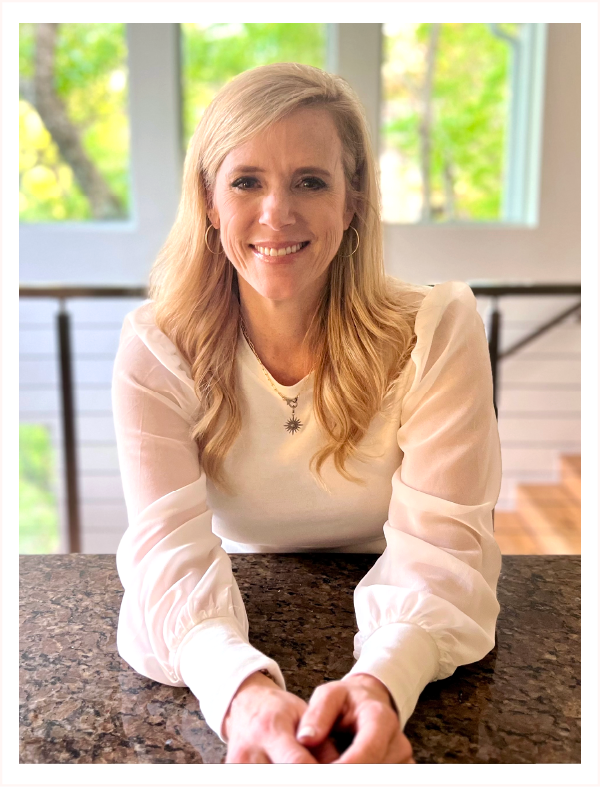Specializing in women's issues.
Individual psychotherapy for adults and seniors in Texas.
There's a good reason for whatever you are doing or not doing, and I help you find it and change it.
These are the kinds of problems I can help with:
Anxiety
Depression
Pregnancy loss and complications, postpartum stress
Emotional eating, yo-yo dieting and body image issues
Divorce and high conflict coparenting
Midlife transitions, such as empty nest and career change
Remarriage and blended families
Grief due to loss of close family members, pet loss
Helping aging parents or a loved one with dementia
Living with a partner who has an addiction or mental illness

What is it like to have me as your therapist?
My clients describe me as genuine, curious, and kind, but direct and even gently challenging when it’s helpful. They say that after some time in therapy with me, they can hear my voice during difficult times, reminding them of what we have talked about.
I always assume that there is a good reason for whatever you are doing or not doing, even if if it's not working, and I try to help you find it...rather than seeing my clients as defective. I believe that everyone has strengths and that change is always possible.
Sometimes therapy can be intense, so I try to lighten it up when I can. The best ever is when I know a client so well that we can laugh together about what's happening.
With all of my clients:
I start by getting to know you. Techniques and interventions don't work without trust, privacy and safety.
I give a lot of feedback about what I think might be getting in your way.
I like to teach a little about the brain because it can help to understand how we humans are "wired".
I tend to include thought work, which means I help you recognize how your thoughts affect your emotions and actions.
I lean toward approaches that focus on living in the here and now, which are also backed by science.
With each individual:
I draw on my 25+ years of experience to decide which approach might be most helpful.
For those who enjoy homework and assignments, we can do very active work.
For those who don't, all you need to do is show up for your appointments.
I recommend starting with weekly visits so that I can get to know you, but we decide together how often and for how long to meet.
I check in regularly to be sure that we are working toward your goals and making progress.
Your therapist has to feel like a good fit.
We can meet to see what it's like.

You can schedule a free video consultation with me.
You can ask any questions you'd like.
We'll discuss whether online therapy is a good choice for you.
I'll ask about past experience with therapy and what you hope to gain.
I am very careful about making sure it is a good match that will give you the care you need and also fits within my practice.
First, I'll want to know what kind of help you are looking for. To get started:
Email: jill@drjillforeman.com
Call or text: 512-200-3112. I answer the phone myself.
You need to know that….
I do not accept most insurance.
However, if you have out-of-network benefits, you may be able to file claims yourself, for some reimbursement from your insurance company. I provide a superbill invoice for this purpose.
You also might want to investigate services that will do this work for you.
I use telehealth.
My clients like the convenience of online therapy, and this allows me to see all Texas residents.
But, it's not right for everyone, and I assess whether in-person therapy might be a better choice.
Research shows that the relationship is the most important factor in what makes therapy work.
I also use science-backed third-wave cognitive-behavioral therapies (CBT), including:
ACT
Acceptance and Commitment Therapy
ACT teaches you how to stop struggling with your feelings. Instead, you learn that they are normal responses to different situations, which don't need to stop you from moving forward in your life.
With this understanding, it is easier to accept tough times. You can commit to taking the action you want, regardless of what is happening in your life and how you feel about it. This helps to deal with what you can't control or change, by sticking to what is most important to you.
MBCT/MBSR
Mindfulness Based Cognitive Therapy/Stress Reduction
The word "mindfulness" is used a lot right now, and not always correctly. Research shows that we enjoy our lives less when our minds are stuck in regretting the past or worrying about the future.
These approaches teach how to be in the here and now, which helps to break out of negative thought patterns and be present in the moment. This can include body scans for increased awareness, meditation and breathing exercises.
CBT
Modern Cognitive-Behavioral Therapy
Thoughts create emotions, which drive actions and results. We all develop thought patterns that become our default beliefs, without ever questioning whether we want these thoughts to guide our lives.
CBT helps you to recognize your mind chatter and how it is affecting you. Becoming aware of the "stories" you are telling yourself helps to neutralize them, and to find thoughts that are more helpful and useful.
These approaches, plus trust and caring, can change your life.
Call or text: 512-200-3112
Email: jill@drjillforeman.com
©2023 Dr. Jill Foreman. All rights reserved. | Privacy Policy | Terms | Disclaimer
You have the right to receive a Good Faith Estimate of what your services may cost. | No Surprises Act


